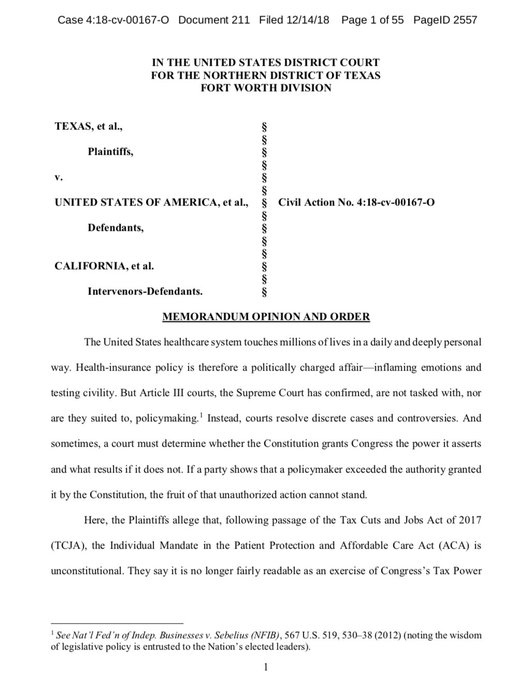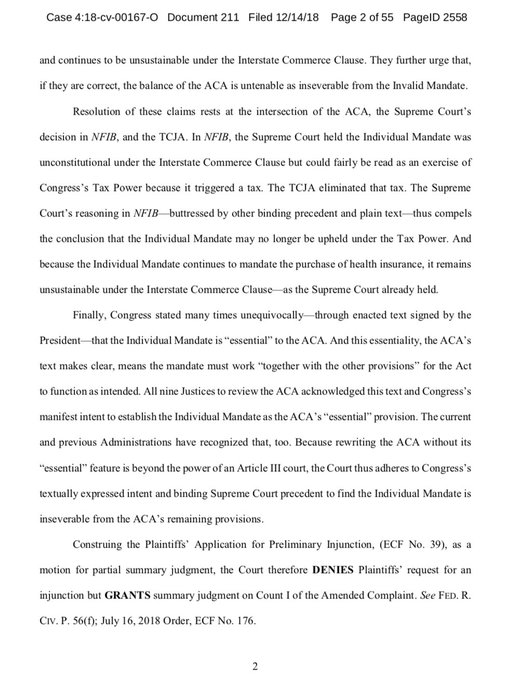
Carolinian
Judge Reed O’Connor is a federal judge based in Texas who struck down the Affordable Care Act on Friday, writing a 55-page opinion that deemed the law’s individual mandate to be unconstitutional and arguing that that entailed the rest of the law’s invalidity, as well.
For the time being, people are still able to enroll in ACA during open enrollment, as an appeals process is already in place.
Immediately following the ruling, Donald Trump took to Twitter to celebrate the ruling. He tweeted, “As I predicted all along, Obamacare has been struck down as an UNCONSTITUTIONAL disaster! Now Congress must pass a STRONG law that provides GREAT healthcare and protects pre-existing conditions. Mitch and Nancy, get it done!”
O’Connor was an appointee of George W. Bush and has handed out a series of controversial opinions in his career. Here’s what you need to know:
1. O’Connor Ruled That the Affordable Care Act Was Unconstitutional Because of a 2012 Supreme Court Ruling
Per The Washington Post, O’Connor wrote a 55-page opinion arguing that the Affordable Care Act was unconstitutional largely because of a decision handed down by the Supreme Court in 2012. Specifically, because of Chief Justice John Roberts’ majority opinion which read in part, “[Congress] does have the power to impose a tax on those without health insurance.”
Following this logic, Connor wrote that the individual mandate of the ACA “can no longer be fairly read as an exercise of Congress’ tax power.”
In his ruling, O’Connor acknowledged that the issue of health care is “a politically charged affair – inflaming emotions and testing civility… [but courts] are not tasked with, nor are they suited to, policymaking.”
2. O’Connor Was Born in Houston, Texas & Was Nominated by George W. Bush to the District Court

The Federalist Society
O’Connor is a native Texan, and was nominated to the district court by George W. Bush. According to The Washington Post, this isn’t the first time O’Connor has issued a ruling on the ACA; in 2016, he issued a nationwide injunction on an Obama policy that forbade health-care providers from discriminating against individuals based upon their gender identity.
Additionally, in 2015, O’Connor issued a ruling that blocking the extension of medical leave benefits to gay couples.
3. O’Connor Blocked Several Obama-Era Policies Aimed at Increasing the Rights of the Transgender Community
On August 22, 2016, O’Connor blocked an Obama-era policy from going into effect, one which advised school districts that transgender students should be able to access bathrooms based upon their gender identity, not just their sex. Via NPR, O’Connor wrote that the Obama administration’s use of Title IX in this instance was inaccurate, and that the law was “not ambiguous.”
In his opinion, O’Connor ordered all parties must “maintain the status quo.” He wrote in part, “[It] cannot be disputed that the plain meaning of the term sex as used … following passage of Title IX meant the biological and anatomical differences between male and female students as determined at their birth.”
Then, on December 31, 2016, O’Connor blocked another transgender policy, this time one aimed at protecting transgender individuals from discrimination within health care. According to The Houston Chronicle, O’Connor argued that the policy violated the Religious Freedom Restoration Act and that the nation’s laws preventing discrimination by sex were being unduly stretched to include discrimination based on gender.
4. O’Connor Struck Down the Indian Child Welfare Act in Another Controversial Ruling in October
On October 5, O’Connor wrote a 46-page opinion declaring the Indian Child Welfare Act to be a “race-based statute.” The act was initially enacted in 1978, and was meant to remedy the epidemic of Native children being separated from their families by private adoption agencies and state child welfare.
He wrote in part, “The ICWA’s racial classification applies to potential Indian children, including those who will never be members of their ancestral tribe, those who will ultimately be placed with non-tribal family members, and those who will be adopted by members of other tribes. Because two of the three preferences have no connection to a child’s tribal membership, this blanket classification of Indian children is not narrowly tailored to a compelling governmental interest and thus fails to survive strict scrutiny review.”
5. O’Connor Is a Frequent Contributor to The Federalist Society
The Federalist Society is an organization comprised of conservatives and libertarians who are “dedicated to reforming the current legal order,” according to the About Page. The mission statement reads in part,
We are committed to the principles that the state exists to preserve freedom, that the separation of governmental powers is central to our Constitution, and that it is emphatically the province and duty of the judiciary to say what the law is, not what it should be. The Society seeks to promote awareness of these principles and to further their application through its activities.
O’Connor is listed as a contributor to the society.


